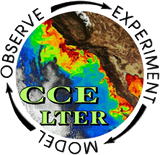 ©2026 Biological and Chemical Oceanography Data Management Office.
©2026 Biological and Chemical Oceanography Data Management Office.Funded by the U.S. National Science Foundation
From ccelter.edu:
The California Current System is a coastal upwelling biome, as found along the eastern margins of all major ocean basins. These are among the most productive ecosystems in the world ocean. The California Current Ecosystem LTER (32.9 degrees North, 120.3 degrees West) is investigating nonlinear transitions in the California Current coastal pelagic ecosystem, with particular attention to long-term forcing by a secular warming trend, the Pacific Decadal Oscillation, and El Nino in altering the structure and dynamics of the pelagic ecosystem. The California Current sustains active fisheries for a variety of finfish and marine invertebrates, modulates weather patterns and the hydrologic cycle of much of the western United States, and plays a vital role in the economy of myriad coastal communities.
LTER Data:
The California Current Ecosystem (CCE) LTER data are managed by and available directly from the CCE project data site URL shown above. If there are any datasets listed below, they are data sets that were collected at or near the CCE LTER sampling locations, and funded by NSF OCE as ancillary projects related to the CCE LTER core research themes.
NSF Award Abstract (OCE-2224726):
Coastal upwelling regions are found along the eastern boundaries of all ocean basins and are some of the most productive ecosystems in the ocean. This award is supporting the California Current Ecosystem Long Term Ecological Research (CCE LTER) site in a major upwelling biome. It leverages the 73-year California Cooperative Oceanic Fisheries Investigations (CalCOFI) program which provides essential information characterizing climate variability and change in this system. The CCE LTER addresses two over-arching questions: What are the mechanisms leading to ecological transitions in a coastal pelagic ecosystem? And what is the interplay between changing ocean climate, community structure, and ecosystem dynamics? The investigators are working towards diagnosing mechanisms of ecosystem change and developing a quantitative framework for forecasting future conditions and how these might affect the management of key living marine resources, including numerous fishes, invertebrates, marine mammals, and seabirds. They are training graduate and undergraduate students, as well as providing educational opportunities for teachers. Public programs and outreach efforts in collaboration with the Birch Aquarium at Scripps Institution of Oceanography are increasing public awareness and understanding of climate effects on coastal pelagic communities and connecting the public to cutting-edge ocean research.
This project is adding to understanding of the mechanisms underlying abrupt ecological transitions with three interrelated foci: (1) investigation of marine heatwaves and resultant multiple stressors on organisms and communities, (2) elucidation of ecological stoichiometry and the response of multiple trophic levels to altered elemental ratios of source nutrients, and (3) analysis of top-down pressures mediated by a diverse suite of organisms. It is sustaining multi-scale measurements of five core LTER variables and responses to ocean warming, increased stratification, acidification, deoxygenation, and altered nutrient stoichiometry in the Northeast Pacific. The investigators are using long-term, spatially-resolved time series at multiple spatial scales to evaluate community shifts at multiple temporal scales, with new measurements allowing interrogation at finer taxonomic levels. They are conducting in situ multi-factorial experiments (temperature, macronutrients, micronutrients, light, grazing) in combination with genomic and transcriptomic analyses. These will complement time series measurements, inform next-generation biogeochemical models, and test hypotheses related to ecological stoichiometry and marine heatwaves. The team is also using a suite of imaging techniques, molecular and morphological methods, and active and passive acoustic approaches to quantify vertical structure and cooccurrence of organisms across trophic levels and test hypotheses about top-down control of the ecosystem.
This award reflects NSF's statutory mission and has been deemed worthy of support through evaluation using the Foundation's intellectual merit and broader impacts review criteria.
This project is supported by continuing grants with name variations:
Additional data for this site are managed by and directly available from the project data site: https://ccelter.ucsd.edu/data-links/

Lead Principal Investigator: Katherine Barbeau
University of California-San Diego Scripps (UCSD-SIO)
Co-Principal Investigator: Andrew E. Allen
University of California-San Diego Scripps (UCSD-SIO)
Co-Principal Investigator: Lihini Aluwihare
University of California-San Diego Scripps (UCSD-SIO)
Co-Principal Investigator: Arthur J. Miller
University of California-San Diego Scripps (UCSD-SIO)
Co-Principal Investigator: Michael R. Stukel
Florida State University (FSU)
Data Manager: Marina Frants
University of California-San Diego Scripps (UCSD-SIO)
Ocean Carbon and Biogeochemistry [OCB]
Long Term Ecological Research network [LTER]
DMP_OCE-2224726_Barbeau.pdf (277.02 KB)
08/07/2024